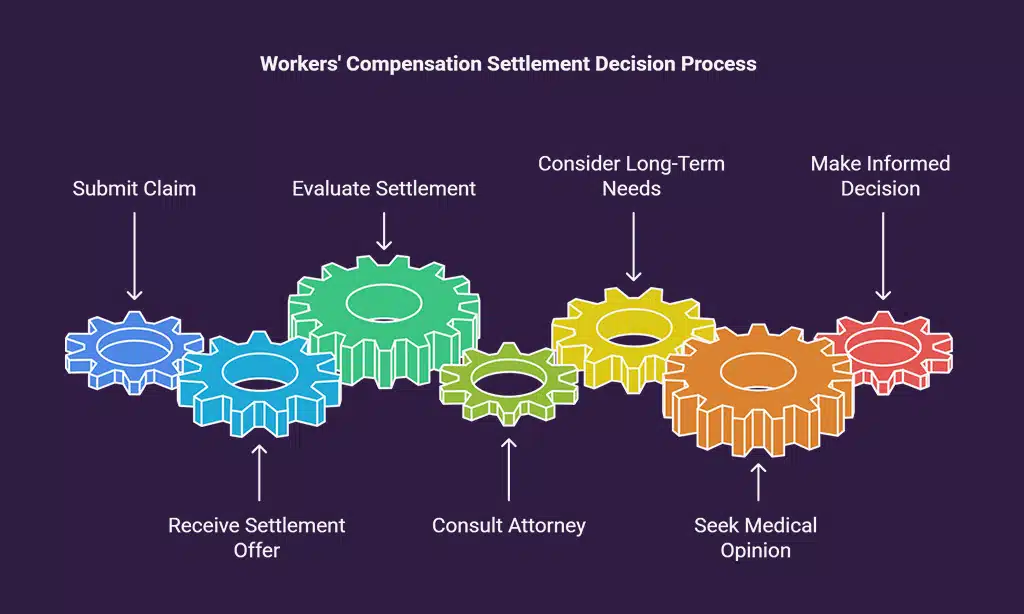Workers’ compensation is a critical safety net for employees who suffer work-related injuries or illnesses. It ensures that workers receive compensation for medical expenses, lost wages, and other benefits, providing financial security during recovery.
However, while the system is in place to protect employees, navigating it can be complex and filled with common pitfalls that often lead to claim denials, delayed payments, or even lost benefits.
In this comprehensive guide, we will dive into the most common pitfalls in workers compensation claims. By recognizing these challenges and arming yourself with knowledge, you can increase the likelihood of a smooth claims process and ensure you receive the benefits you deserve.
From common mistakes made when reporting injuries to accepting settlement offers prematurely, this article will provide valuable insights to help you avoid costly missteps.
Understanding Workers’ Compensation
Before we dive deeper into the common pitfalls, it’s essential to first understand what workers’ compensation is and how it works. Workers’ compensation is an insurance program provided by employers that offers compensation for employees who are injured or become ill as a result of their work.
Each state in the U.S. manages its own system, which means rules, benefits, and claims processes can vary. However, the overarching purpose of workers’ compensation is to provide financial assistance for medical expenses, rehabilitation, and lost wages during an employee’s recovery.
Some benefits provided by workers’ compensation include:
- Medical benefits: Covering medical treatment, surgeries, prescriptions, and therapy.
- Temporary disability benefits: Partial compensation for lost wages while the employee is temporarily unable to work.
- Permanent disability benefits: Ongoing compensation for workers who suffer long-term impairment.
- Death benefits: Payments to the families of workers who die as a result of a work-related injury or illness.
Workers’ compensation is meant to streamline the process and prevent employees from having to resort to lawsuits to obtain compensation. However, navigating the claims process can be difficult. Let’s take a closer look at the most common pitfalls workers face in this system.
Common Pitfalls in Workers’ Compensation Claims
Navigating the workers’ compensation system can be challenging, with various obstacles that can derail even the most straightforward of claims. Whether it’s a minor injury or a more serious condition, making mistakes early in the claims process can have a significant impact on the outcome. In this section, we’ll explore some of the common pitfalls in workers’ compensation claims that workers should avoid to ensure their claims are processed efficiently and fairly.
1. Failing to Report the Injury or Illness Immediately
Promptly reporting your injury or illness to your employer is crucial to the success of your workers’ compensation claim. Many workers delay reporting injuries, believing the injury isn’t severe or symptoms will subside. However, not reporting an injury in a timely manner can severely impact the outcome of your claim.
Why it Matters:
- Timely Reporting: Most states have a strict timeframe in which an injury must be reported (typically between 24-72 hours). Missing this window can result in claim denials.
- Documentation: Reporting an injury early creates a clear timeline, establishing a connection between the injury and the workplace, which is crucial for proving your case.
- Employer Cooperation: Reporting early gives your employer the opportunity to file a workers’ compensation claim on your behalf. The longer you wait, the more likely your employer may question the cause of the injury or be reluctant to cooperate.
Pitfalls and How to Avoid Them:
| Pitfall | How to Avoid |
| Delaying injury reports | Report immediately after the injury occurs. |
| Failing to complete proper forms | Ensure all required forms are filled out accurately and submitted on time. |
| Not confirming employer acknowledgment | Ask for written confirmation that you reported the injury. |
Case Study: In a case from Illinois, a worker injured his back at work but failed to report the injury for two weeks, thinking it would get better on its own. When he finally filed the claim, the insurer denied it due to the delayed report, arguing that the injury was not work-related. It wasn’t until he provided evidence of other incidents that led to the injury that his claim was approved after months of delays.
2. Not Seeking Medical Attention Right Away
Seeking medical attention immediately after a workplace injury is essential not only for your health but also for documenting the injury. Workers who delay medical treatment risk further complications to their health and jeopardize their workers’ compensation claims by not establishing a clear medical record.
Why it Matters:
- Medical Documentation: Your medical records are a primary piece of evidence in your workers’ compensation claim. Delaying medical attention can result in incomplete or missing records, which makes it harder to prove the severity and nature of the injury.
- Exacerbation of Injury: What may seem like a minor injury can worsen over time if left untreated, complicating both your health and your claim.
- Lack of Credibility: If there is a gap between the injury and your first medical visit, the insurance company or employer might argue that the injury wasn’t serious enough to warrant treatment, which can hurt your case.
Pitfalls and How to Avoid Them:
| Pitfall | How to Avoid |
| Waiting too long to get medical treatment | See a doctor immediately after the injury occurs. |
| Not following the doctor’s orders | Stick to the prescribed treatment and attend all follow-up appointments. |
| Ignoring minor injuries | Always err on the side of caution and seek medical attention even for seemingly minor injuries. |
Example: A construction worker who fell from a ladder didn’t seek medical attention for several days, hoping the pain would subside. By the time he saw a doctor, his injury had worsened, requiring more extensive treatment. The delay caused his claim to be delayed and questioned by the insurer, ultimately leading to prolonged disputes over the severity of the injury.
3. Choosing the Wrong Doctor
Some states allow workers to choose their own doctor for workers’ compensation claims, while others may require that employees see a doctor within the workers’ compensation network. Choosing the wrong doctor—whether outside the network or one who lacks experience in work-related injuries—can harm your claim.
Why it Matters:
- Network Rules: In states with workers’ compensation networks, seeing an out-of-network doctor can result in the denial of your claim.
- Experience Matters: Doctors unfamiliar with workers’ compensation claims may fail to document injuries correctly, delaying or undermining your claim.
- Insurance Companies’ Influence: Insurance companies often work with certain healthcare providers who are familiar with the requirements for workers’ compensation claims. A doctor unfamiliar with these processes may not provide the necessary documentation or evidence.
Pitfalls and How to Avoid Them:
| Pitfall | How to Avoid |
| Visiting a non-network doctor | Check if your state requires you to use a specific network of doctors. |
| Choosing an inexperienced doctor | Look for a doctor with experience handling workers’ compensation claims. |
| Not keeping proper medical records | Ensure your doctor provides clear and thorough documentation. |
Case Study: In one instance, an office worker suffering from repetitive strain injury (RSI) went to a family doctor who was not familiar with workers’ compensation protocols. The doctor did not document the connection between the injury and the work environment properly, leading to delays in the approval of benefits. After switching to a specialist in occupational injuries, the claim was finally approved.
4. Not Keeping Detailed Records of the Injury and Treatment
Accurate and comprehensive record-keeping is one of the most crucial aspects of filing a workers’ compensation claim. If you don’t document everything related to your injury—such as the nature of the injury, treatment details, or communication with your employer or insurer—you may face difficulties when proving your case.
Why it Matters:
- Evidence: Records, such as medical bills, doctor’s notes, and written communications with your employer, are essential to support your claim.
- Consistency: Keeping a detailed log ensures that there are no discrepancies between what you reported and what your medical records show.
- Claim Strength: Having well-organized documentation helps build a stronger case, especially if your claim is contested.
Pitfalls and How to Avoid Them:
| Pitfall | How to Avoid |
| Failing to track medical visits | Keep a journal of all doctor visits and treatments. |
| Missing important dates | Record key dates, such as the date of the injury, reporting dates, and medical appointments. |
| Not keeping copies of documents | Keep copies of all paperwork, emails, and medical records. |
Example: An injured worker failed to keep track of the multiple follow-up visits required for a knee injury, and when the insurer challenged the claim, there was no clear record to support the severity of the injury. Without this proof, the claim was delayed by months.
5. Assuming Workers’ Compensation Will Cover All Costs
A common misconception is that workers’ compensation will cover all of an injured worker’s medical expenses and lost wages without question. While workers’ compensation provides vital financial support, it doesn’t always cover every expense incurred as a result of a work-related injury or illness. It’s crucial to understand the limitations of the benefits available and be prepared for potential out-of-pocket costs.
Why it Matters:
- Limited Coverage: Workers’ compensation typically covers only medical expenses directly related to the injury, and often only up to a specific cap for lost wages. This may leave some workers with significant medical bills, especially if the injury requires long-term care or rehabilitation.
- Disability Benefits: The wage replacement benefits often only cover a percentage (usually two-thirds) of your pre-injury wages, which may not be sufficient to cover your living expenses.
- Additional Expenses: In some cases, expenses related to a work injury, such as therapy, assistive devices, or modifications to your home, may not be fully covered by workers’ compensation.
Pitfalls and How to Avoid Them:
| Pitfall | How to Avoid |
| Assuming all costs are covered | Understand the full scope of your benefits and their limitations. |
| Not accounting for additional expenses | Keep track of all out-of-pocket costs for medical care and therapy. |
| Failing to plan for wage gaps | Prepare for the possibility of lost income by budgeting and seeking additional sources of support. |
Example:
A factory worker who suffered a back injury assumed that his workers’ compensation benefits would cover all medical expenses, including the cost of physical therapy. However, the insurance company denied coverage for some of his ongoing therapy sessions, which were deemed “non-essential.” As a result, he had to cover the cost of therapy out of pocket, straining his financial situation during recovery.
6. Accepting the First Settlement Offer Without Review
After submitting your workers’ compensation claim, you may receive a settlement offer from the insurance company. It can be tempting to accept the offer, especially if you need the money quickly. However, accepting the first settlement offer without fully understanding the long-term consequences can lead to receiving less compensation than you’re entitled to.
Why it Matters:
- Early Settlement Pressure: Insurers often offer settlements early in the claims process to close the case quickly and avoid further liability. While these offers might seem attractive, they are typically calculated with the assumption that you will not contest the amount.
- Long-Term Impact: An early settlement might not account for future medical expenses or long-term lost wages. Injuries may worsen over time, requiring additional treatment or causing permanent disability.
- Underestimated Costs: The first settlement offer might fail to account for hidden costs such as ongoing rehabilitation, home modifications, or future surgeries that could be necessary as a result of the injury.
Pitfalls and How to Avoid Them:
| Pitfall | How to Avoid |
| Accepting a settlement too quickly | Consult a workers’ compensation attorney to ensure the settlement amount is fair. |
| Not considering long-term needs | Consider future medical care needs, ongoing therapy, and potential permanent disability before settling. |
| Failing to evaluate the full impact of the injury | Seek a second opinion from medical professionals to understand the full extent of your injury. |
Case Study: A restaurant worker suffered a wrist injury from a repetitive task but accepted an early settlement offer from the insurance company. She did not consult a lawyer, assuming that the offer covered all her expenses. A year later, her wrist condition worsened, requiring surgery and ongoing rehabilitation. Had she waited for a more thorough review, she might have received a larger settlement to cover these new medical costs.
7. Failing to Follow the Claim Process Properly
The workers’ compensation claims process involves numerous steps, from reporting the injury to submitting required documentation and attending medical evaluations. Missing a deadline, submitting incorrect paperwork, or failing to follow required steps can result in claim delays or denials. Many workers, especially those without legal representation, may find it difficult to navigate this complex process.
Why it Matters:
- Complex Process: Workers’ compensation claims require strict adherence to rules and deadlines. Missing even a small detail can result in delays that prolong the time it takes to receive benefits.
- Paperwork Issues: Errors in the forms, incomplete documentation, or missing signatures can lead to rejection of your claim.
- Appeals Process: If your claim is denied or delayed, there is an appeals process. However, this process can be lengthy and requires additional documentation and legal steps.
Pitfalls and How to Avoid Them:
| Pitfall | How to Avoid |
| Missing deadlines | Keep track of all deadlines, including when to submit paperwork and appeal a decision. |
| Submitting incorrect forms | Double-check all forms for accuracy and completeness before submission. |
| Failing to submit necessary documents | Make sure all medical records, witness statements, and other relevant documents are submitted on time. |
Example: A construction worker who suffered a knee injury filed his workers’ compensation claim, but he failed to submit the required medical reports from his treating physician. As a result, his claim was delayed for several months, and he faced additional hurdles to provide the missing documentation. Had he followed the process carefully, his claim would have been processed more quickly.
8. Not Seeking Legal Assistance
Many workers attempt to handle their workers’ compensation claims on their own, assuming that they can manage the process without the help of a lawyer. However, workers’ compensation law can be intricate, and without legal representation, you may miss out on compensation you are rightfully entitled to, or you may find your claim delayed or denied.
A workers’ compensation attorney can guide you through the legal complexities and ensure that your case is handled correctly.
Why it Matters:
- Expertise: Lawyers specializing in workers’ compensation understand the nuances of the law and can help ensure that all necessary forms and documentation are properly submitted.
- Maximizing Compensation: A lawyer can help negotiate fair settlements, ensuring you receive adequate compensation for medical expenses, lost wages, and long-term disability, if applicable.
- Appeals and Disputes: If your claim is denied, a lawyer can help you file an appeal and represent your interests in hearings or settlements, increasing your chances of a favorable outcome.
Pitfalls and How to Avoid Them:
| Pitfall | How to Avoid |
| Navigating the system alone | Hire an experienced workers’ compensation attorney to guide you through the claims process. |
| Settling for less than you deserve | Consult a lawyer to ensure that your settlement offer accurately reflects your injury’s long-term impact. |
| Missing out on benefits due to errors | A lawyer can help identify any additional benefits you’re entitled to and ensure they’re included in your claim. |
Case Study: A warehouse worker suffered an injury from lifting a heavy object and initially handled the claim without a lawyer. His claim was denied due to technicalities in the paperwork. After seeking legal help, an attorney discovered that certain medical records had been omitted, and additional benefits were available for his situation. With the lawyer’s help, the claim was approved, and he received a more substantial settlement.
Wrap Up: Navigating Workers’ Compensation Claims with Confidence
Filing a workers’ compensation claim may seem straightforward, but there are many common pitfalls that can delay, reduce, or even deny your benefits. From failing to report an injury promptly to not seeking professional legal help, there are numerous hurdles that can complicate your case. By being proactive and informed, you can avoid these mistakes and ensure that you receive the compensation you deserve.
As you navigate the workers’ compensation process:
- Ensure that you report injuries and seek medical treatment immediately.
- Keep detailed records of all medical visits, communications, and treatments.
- Avoid settling too quickly—take the time to understand the full extent of your injury and its long-term implications.
- Consider working with a lawyer who specializes in workers’ compensation claims to protect your interests and maximize your benefits.
By following these guidelines and avoiding the common pitfalls outlined in this article, you can navigate the complex world of workers’ compensation with confidence and ensure that you receive the support and benefits you need to recover fully and move forward with your life.










































